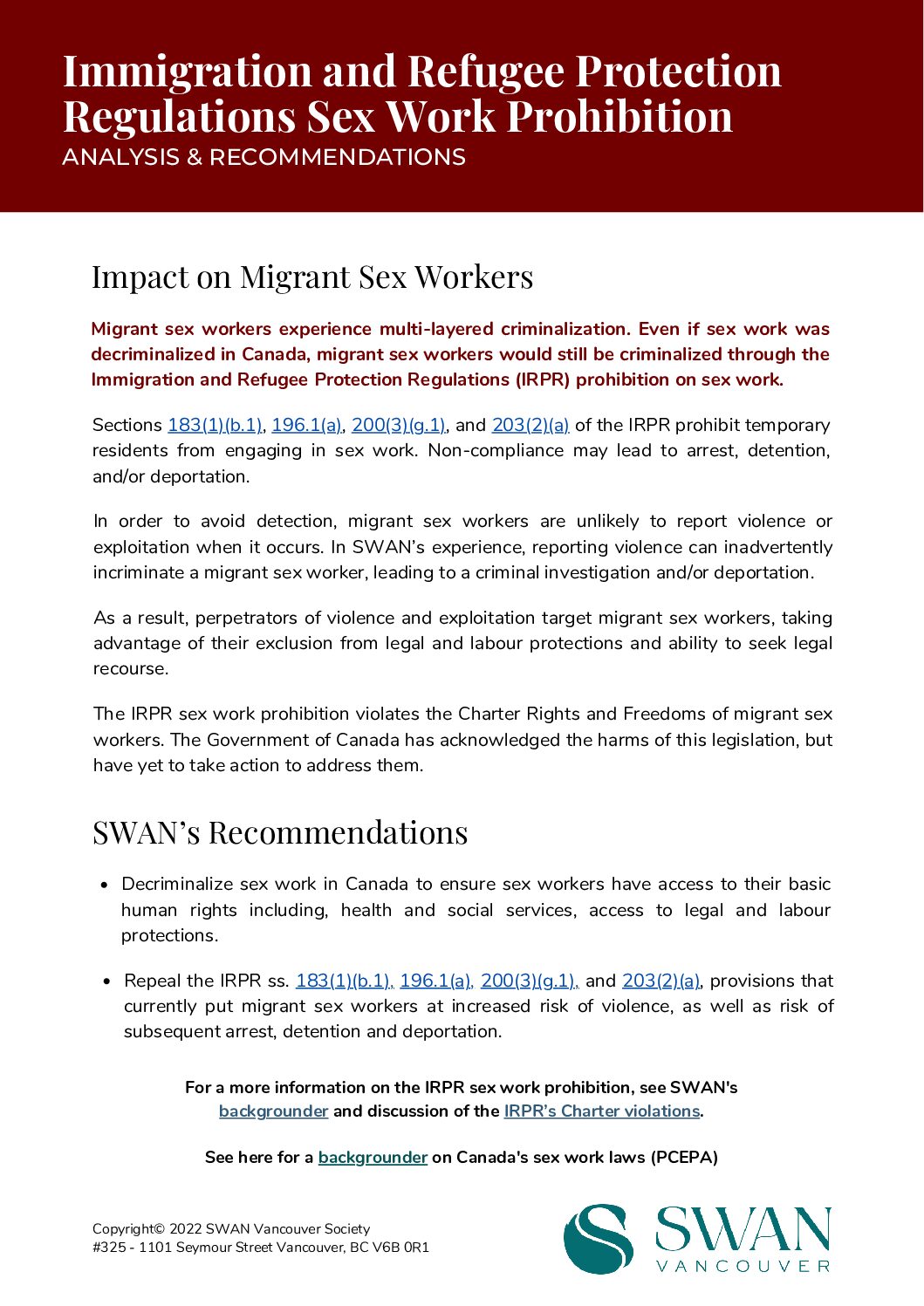Impact on Migrant Sex Workers
Migrant sex workers experience multi-layered criminalization. Even if sex work was decriminalized in Canada, migrant sex workers would still be criminalized through the Immigration and Refugee Protection Regulations (IRPR) prohibition on sex work.
Sections 183(1)(b.1), 196.1(a), 200(3)(g.1), and 203(2)(a) of the IRPR prohibit temporary residents from engaging in sex work. Non-compliance may lead to arrest, detention, and/or deportation.
In order to avoid detection, migrant sex workers are unlikely to report violence or exploitation when it occurs. In SWAN’s experience, reporting violence can inadvertently incriminate a migrant sex worker, leading to a criminal investigation and/or deportation.
As a result, perpetrators of violence and exploitation target migrant sex workers, taking advantage of their exclusion from legal and labour protections and ability to seek legal recourse.
The IRPR sex work prohibition violates the Charter Rights and Freedoms of migrant sex workers. The Government of Canada has acknowledged the harms of this legislation, but have yet to take action to address them.
SWAN’s Recommendations
Decriminalize sex work in Canada to ensure sex workers have access to their basic human rights including, health and social services, access to legal and labour protections.
Repeal the IRPR ss. 183(1)(b.1), 196.1(a), 200(3)(g.1), and 203(2)(a), provisions that currently put migrant sex workers at increased risk of violence, as well as risk of subsequent arrest, detention and deportation.
Government of Canada’s Response
Preventing Harm In The Canadian Sex Industry: A Review Of The Protection Of Communities And Exploited Persons Act (PCEPA)
Canada’s sex work law, PCEPA, was reviewed in 2022. The report by the Parliamentary Standing Committee on Justice and Human Rights (JUST) made the following recommendations in relation to the IRPR sex work prohibition:
- That the Government of Canada table legislation to repeal sections 183(1)(b.1). 196.1(a). 200(3)(g.1) and 203(2)(a) of the Immigration and Refugee Protection Regulations, which unfairly put migrant sex workers at elevated risk of violence and danger by making them unable to report these incidents without fear of deportation.1
- That the Government of Canada consider how to best address the exploitation of migrant sex workers and to prevent findings of inadmissibility and deportation when such individuals report being victims of crime. This could involve amending the Immigration and Refugee Protection Regulations or other measures.2
2 ibid, Recommendation 11, p. 49.
Government Response To The Fourth Report Of The Standing Committee On Justice And Human Rights
The Government of Canada’s response to the JUST report stated that they will be “assessing existing immigration mechanisms that are available to support at-risk foreign nationals” and will explore “possible policy options to address the concerns raised by the Committee, including repealing the Immigration and Refugee Protection Regulations that place foreign national sexual service providers at risk of deportation (i.e., sections 183(1) (b.1) and 196.1(a)).”3
3 Minister of Justice and Attorney General of Canada, Government Response to the Fourth Report of the Standing Committee on Justice and Human Rights, pp. 2-3.
For a more information on the IRPR sex work prohibition, see SWAN’s backgrounder and discussion of the IRPR’s Charter violations.
for the full list of resources

